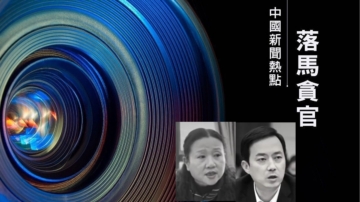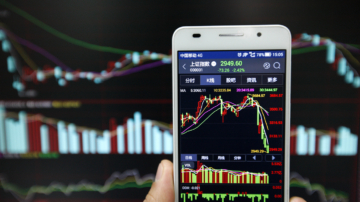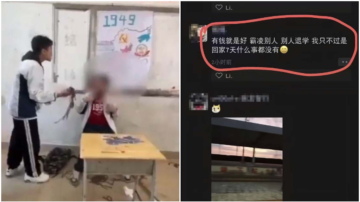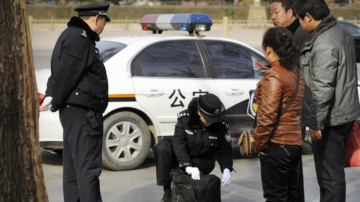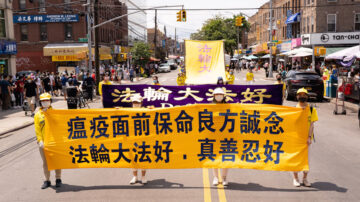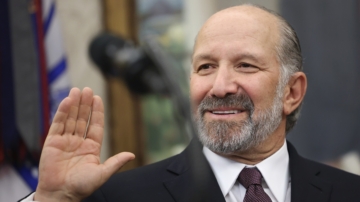【新唐人2011年11月25日訊】中共對「推特」的監控封鎖,促使「微博」崛起,也讓信息審查的困難度大大的提高。最近,北京當局宣佈發起所謂反“錯誤信息”運動,將收緊對微博網頁的監控措施,希望藉此控制反對的聲音。不過有學者認為,一個負責任的政府應該可以完全面對真相並且理性處理。
11月21號,「中國國家互聯網信息」辦公室,在武漢舉行的"中國網路媒體論壇"上宣佈,目前微博註冊用戶已經超過3億。越來越多的網民通過微博發洩對政府腐敗、醜聞和災難的憤怒。「甬溫動車事故」和「艾未未事件」都是透過這個平臺迅速傳開。這使得對媒體嚴厲控制的北京政府感到相當頭疼。
「微博」是網民傳播信息及各種輿論彙集的地方,更是發表個人看法的一個平臺。中外媒體人士一致認為,網上信息交流的活躍,體現了公民的智慧,無疑將促進公民社會發展。然而,三億中國微博用戶,每天數千萬條信息在網上迅速流傳,對於中共長期以來採取的"防火長城"審查機制,可說是個挑戰。
不過,知名評論人陶短房認為,任何社會都有各種各樣的雜音,過去的中國社會,這些雜音都被中共媒體給抹殺了,現在只不過突然有個渠道把它反映出來,卻被當作是在擾亂社會,他說,抱著殭化思想的人才會認為不同聲音是種挑戰。
陶短房:「這些想法不是有了微博才有的,他們有民怨,以比如說對房價問題,對物價問題、對腐敗問題,那麼這種怨氣早就有了,有沒有微博他都會有,那麼現在有一個微博把它表現出來,你有一個互動、一個溝通機會,去把它這個問題去解決、去調整、去互相適應,這是個好事。」
大陸異議作家陳樹慶表示,沒有微博,民怨還是存在,從微博上大家可以看到事件的真相,一個負責任的政府應該可以完全面對真相,理性的處理。
陳樹慶:「真理是在辯論當中愈辯愈明,真相也是在辯論當中互相考證當中愈考愈明,那麼微博的話導致真相真理,在辯論當中、在求證當中得到普遍的認可,那麼這不是分裂儀式,那是得到認同認識,否則的話,如果沒有微博的話,就是謊言的統一。」
海外民運人士王軍濤說,本來微博沒有反對共產黨,只是人民表達意願的形式,但這與共產黨發生衝突,於是共產黨對它加以禁止打壓。
王軍濤:「中共獨裁政權它有一個可惡的地方,就是凡是老百姓想按照自己的想法,進行交流信息,或者想討論一些事情的時候,它都要加以禁止。因為經過這個討論,會使人民意識到中國至少80%的問題實際上是共產黨造成的,人們可能會產生願望改變共產黨政治,所以共產黨對微博進行這種封殺,封鎖。」
有分析人士認為,當局要想完全壓制這種監督政府、和發洩民眾怨怒的網路傳播管道,是不明智,也是不可能的。
新唐人記者常春、李庭、王明宇採訪報導。
China Has Over 300 Million Micro bloggers
The Chinese Communist Party』s (CCP) monitoring and
blockade of Twitter has caused a dramatic rise in the use of micro blogging,
making it harder for the regime to censor information.
Recently, Beijing authorities announced the launch of
its so-called 『anti-wrong messages』 campaign, which is to
further tighten control measures on micro blogging,
in order to control the entire world of Chinese micro blogging.
Some scholars believe that a responsible government should be
able to fully face the truth and take rational measures.
On November 21, China's National Internet Information office,
held China's Internet Media Forum in Wuhan,
and announced that there are currently over 300 million
registered micro bloggers.
More and more Internet users are venting their anger
through the use of micro blogging, voicing their opinions about government corruption, scandals, and disasters.
News of the Yongwen motor car accident and the
case of Ai Weiwei, were quickly spread using this platform.
It』s quite a headache for Beijing,
which has tight control of the media.
Micro blogging is a way of disseminating information and
pooling of all kinds of opinions. It is also a platform to present one』s personal views.
Media people in China and abroad all agree that the active
exchange of information online, reflects the wisdom of citizens,
and will undoubtedly promote the development of civil society.
With over 300 million Chinese micro bloggers sending out
tens of millions of pieces of information on the Internet, every day,
represents a challenge to the CCP』s so-called 『Great Firewall.』
The well-known critic, Tao Duanfang, said that in any society,
there are a variety of voices.
In the past, the CCP』s media has silenced virtually
every one of them.
Now that these voices have suddenly found a channel to
the rest of humanity, they are being labeled as 『disturbing the society.』
He said, only rigid, narrow-minded people would think
different voices are challenges.
Tao Duanfang: "These ideas did not come out after micro
blogging came into existence.
People have grievances, say around housing, goods, and
corruption.
These grievances were already there,
therefore they have nothing to do with micro blogging.
Then micro blogging came along and so there is an opportunity
to interact and communicate with others about such issues,
and to solve the problem together,
to adjust and to adapt to each other. This is a good thing."
Chen Shuqing, a dissident writer in China said if there is
no such thing as micro blogging, people』s resentment would still exist.
People can see the truth through micro blogging.
A responsible government should be able to fully face the
truth and take rational measures.
Chen Shuqing: "Truth gets clearer in debating, and in research.
Micro blogging brings issues to the surface where they can be
effectively debated and researched with other people.
Micro blogging helps people reach common ground.
Without it, people would be lost in their own lies."
Wang Juntao, a democracy movement activist,
said micro blogging did not go against the CCP originally,
but it did serve as a platform for people to express their opinions.
However, this conflicts with the CCP』s agenda, so is banned.
Wang Juntao: "The Chinese regime has a nasty character,
that is, whenever people want to follow their own ideas to exchange information,
or discuss something, the CCP will ban them.
Because after this discussion, people will find out at least
80% of the problem is actually caused by the CCP,
so that people may wish to change the communist regime,
so the CCP would ban and block micro blogging."
Some analysts believe that if the CCP authorities want to
completely suppress the watchdog of government,
or the channels to vent peoples』 resentment,
it is unwise and impossible.
NTD reporters Chang Chun, Li Ting and Wang Mingyu
11月21號,「中國國家互聯網信息」辦公室,在武漢舉行的"中國網路媒體論壇"上宣佈,目前微博註冊用戶已經超過3億。越來越多的網民通過微博發洩對政府腐敗、醜聞和災難的憤怒。「甬溫動車事故」和「艾未未事件」都是透過這個平臺迅速傳開。這使得對媒體嚴厲控制的北京政府感到相當頭疼。
「微博」是網民傳播信息及各種輿論彙集的地方,更是發表個人看法的一個平臺。中外媒體人士一致認為,網上信息交流的活躍,體現了公民的智慧,無疑將促進公民社會發展。然而,三億中國微博用戶,每天數千萬條信息在網上迅速流傳,對於中共長期以來採取的"防火長城"審查機制,可說是個挑戰。
不過,知名評論人陶短房認為,任何社會都有各種各樣的雜音,過去的中國社會,這些雜音都被中共媒體給抹殺了,現在只不過突然有個渠道把它反映出來,卻被當作是在擾亂社會,他說,抱著殭化思想的人才會認為不同聲音是種挑戰。
陶短房:「這些想法不是有了微博才有的,他們有民怨,以比如說對房價問題,對物價問題、對腐敗問題,那麼這種怨氣早就有了,有沒有微博他都會有,那麼現在有一個微博把它表現出來,你有一個互動、一個溝通機會,去把它這個問題去解決、去調整、去互相適應,這是個好事。」
大陸異議作家陳樹慶表示,沒有微博,民怨還是存在,從微博上大家可以看到事件的真相,一個負責任的政府應該可以完全面對真相,理性的處理。
陳樹慶:「真理是在辯論當中愈辯愈明,真相也是在辯論當中互相考證當中愈考愈明,那麼微博的話導致真相真理,在辯論當中、在求證當中得到普遍的認可,那麼這不是分裂儀式,那是得到認同認識,否則的話,如果沒有微博的話,就是謊言的統一。」
海外民運人士王軍濤說,本來微博沒有反對共產黨,只是人民表達意願的形式,但這與共產黨發生衝突,於是共產黨對它加以禁止打壓。
王軍濤:「中共獨裁政權它有一個可惡的地方,就是凡是老百姓想按照自己的想法,進行交流信息,或者想討論一些事情的時候,它都要加以禁止。因為經過這個討論,會使人民意識到中國至少80%的問題實際上是共產黨造成的,人們可能會產生願望改變共產黨政治,所以共產黨對微博進行這種封殺,封鎖。」
有分析人士認為,當局要想完全壓制這種監督政府、和發洩民眾怨怒的網路傳播管道,是不明智,也是不可能的。
新唐人記者常春、李庭、王明宇採訪報導。
China Has Over 300 Million Micro bloggers
The Chinese Communist Party』s (CCP) monitoring and
blockade of Twitter has caused a dramatic rise in the use of micro blogging,
making it harder for the regime to censor information.
Recently, Beijing authorities announced the launch of
its so-called 『anti-wrong messages』 campaign, which is to
further tighten control measures on micro blogging,
in order to control the entire world of Chinese micro blogging.
Some scholars believe that a responsible government should be
able to fully face the truth and take rational measures.
On November 21, China's National Internet Information office,
held China's Internet Media Forum in Wuhan,
and announced that there are currently over 300 million
registered micro bloggers.
More and more Internet users are venting their anger
through the use of micro blogging, voicing their opinions about government corruption, scandals, and disasters.
News of the Yongwen motor car accident and the
case of Ai Weiwei, were quickly spread using this platform.
It』s quite a headache for Beijing,
which has tight control of the media.
Micro blogging is a way of disseminating information and
pooling of all kinds of opinions. It is also a platform to present one』s personal views.
Media people in China and abroad all agree that the active
exchange of information online, reflects the wisdom of citizens,
and will undoubtedly promote the development of civil society.
With over 300 million Chinese micro bloggers sending out
tens of millions of pieces of information on the Internet, every day,
represents a challenge to the CCP』s so-called 『Great Firewall.』
The well-known critic, Tao Duanfang, said that in any society,
there are a variety of voices.
In the past, the CCP』s media has silenced virtually
every one of them.
Now that these voices have suddenly found a channel to
the rest of humanity, they are being labeled as 『disturbing the society.』
He said, only rigid, narrow-minded people would think
different voices are challenges.
Tao Duanfang: "These ideas did not come out after micro
blogging came into existence.
People have grievances, say around housing, goods, and
corruption.
These grievances were already there,
therefore they have nothing to do with micro blogging.
Then micro blogging came along and so there is an opportunity
to interact and communicate with others about such issues,
and to solve the problem together,
to adjust and to adapt to each other. This is a good thing."
Chen Shuqing, a dissident writer in China said if there is
no such thing as micro blogging, people』s resentment would still exist.
People can see the truth through micro blogging.
A responsible government should be able to fully face the
truth and take rational measures.
Chen Shuqing: "Truth gets clearer in debating, and in research.
Micro blogging brings issues to the surface where they can be
effectively debated and researched with other people.
Micro blogging helps people reach common ground.
Without it, people would be lost in their own lies."
Wang Juntao, a democracy movement activist,
said micro blogging did not go against the CCP originally,
but it did serve as a platform for people to express their opinions.
However, this conflicts with the CCP』s agenda, so is banned.
Wang Juntao: "The Chinese regime has a nasty character,
that is, whenever people want to follow their own ideas to exchange information,
or discuss something, the CCP will ban them.
Because after this discussion, people will find out at least
80% of the problem is actually caused by the CCP,
so that people may wish to change the communist regime,
so the CCP would ban and block micro blogging."
Some analysts believe that if the CCP authorities want to
completely suppress the watchdog of government,
or the channels to vent peoples』 resentment,
it is unwise and impossible.
NTD reporters Chang Chun, Li Ting and Wang Mingyu

